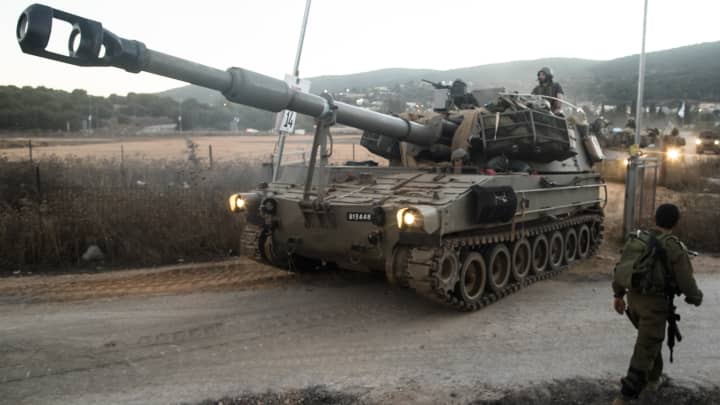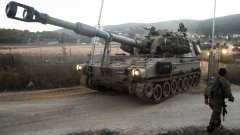
BEIRUT — As Israeli forces expand their ground operations in , anxiety is running high internationally that 's proxies could try to broaden the war into a regionwide conflict.
Yet, despite the belligerent rhetoric from all sides since and the escalation by members of the Iran-led "axis of resistance," few officials who lead Israel's northern neighbor believe that Iran and its partners want an all-out war. The axis of resistance includes Hamas in Gaza and , as well as powerful and .
Anxiety in is instead focused on one wild card: Israeli Prime Minister . Netanyahu's political insecurity brought on by the crisis in Gaza and deepening unpopularity at home have many fearing that he could fire up the cross-border war to a full boil, spilling it into Lebanon, Syria, Iraq and Yemen and even scalding American naval assets in the Mediterranean Sea.
Many among Lebanon's officialdom — NBC News spoke to a dozen diplomats, military chiefs and leaders of militant organizations for this article — fear that Netanyahu may turn his personal troubles into a regional nightmare.
"Rationality has nothing to do with it," said one Western diplomat based in Lebanon, referring to Israel's reactions to Hamas' Oct. 7 attack. The official added his conviction that and its proxies will do their best to avoid starting a war with Israel despite their recent posturing. "The Israeli government needs to show that they won at the end of the day."
Meanwhile, Netanyahu and Israel's top military leaders have come under harsh criticism since the Oct. 7 attacks. And Netanyahu's handling of the crisis has made things worse: that he is the best person to run the government, according to a poll in early November.
For weeks, Netanyahu and other top Israeli security officials have threatened Iran and Hezbollah, a southern Lebanon-based militant group and political party, with war. Only last week, Netanyahu warned once again that "if Hezbollah makes a mistake and enters into a broad war it will have destroyed Lebanon with its own hands," according to the Times of Israel.
Read more from NBC News:
In response to a request for comment for this story, a senior Israeli official told NBC News: "It is the Iranian regime that foments terror and instability in the Middle East and beyond, either directly or via its proxies in Gaza, Lebanon, Syria and Yemen. The international community realizes that the tyrants in Tehran are the world's chief sponsor of terrorism."
For many in the region, such language smacks of a dangerous kind of weakness rather than strength. Netanyahu resembles a "wounded animal," said Ali Hamdan, an influential adviser to Lebanon's -aligned speaker of Parliament — far more dangerous in his weakness than he was in his strength.
Netanyahu faces pressure from all sides, squeezed between a public furious over his handling of the crisis and fraud charges that could see him thrown in jail if he's pushed out of office.
"Netanyahu, on a personal level, he needs to do something. If this war stops tomorrow, he could be held accountable," said Abbas Ibrahim, a hostage negotiator who directed Lebanon's intelligence agency for more than a decade until March. "If he defeats Hamas and Hezbollah, he could be a hero at the end of this year — to protect himself, not his people."
Netanyahu has an incentive to possibly prolong the Israeli military offensive in Gaza to try to safeguard his political survival, according to one person familiar with U.S. intelligence on Israel.
But there are no indications at the moment that he or his government are currently considering launching a major campaign against Hezbollah in Lebanon, this person said.
Almost a year before the latest round of fighting, , which many Israelis saw as an effort to kneecap the country's legal system, had sparked unprecedented protests and set the country against itself.
Many of Netanyahu's opponents had openly suggested that his proposals were themselves a bid to limit the power of a legal system that had charged him with fraud, breach of trust and accepting bribes in three separate cases. .
The prime minister's unpopularity paints him into a corner.
If Netanyahu hopes to show his constituents that Israel is winning in Gaza, one concern in and the Middle East is that the definition of an Israeli "win" in the Palestinian enclave remains nebulous: U.S. and Western officials say Israel does not have a coherent political plan once its military campaign is completed.
Washington has also struggled to outline the . Israel's stated goal of ousting Hamas could leave a perilous power vacuum that few Palestinian politicians or groups could hope to fill.
But even if regional worries are focused on Netanyahu, Hezbollah and other Iran-backed proxy groups have hardly been shying away from a fight.
Since the day after Hamas' terrorist attacks, and other projectiles into northern Israel, forcing tens of thousands of Israelis to evacuate. Israeli retaliatory fire has killed 100 Hezbollah fighters, at least 18 Lebanese civilians and forced more than 30,000 Lebanese people from their homes.
Yet, the fighting over Israel's border with Lebanon has remained relatively constrained, hewing to unspoken rules of engagement that emerged from Israel's monthlong war with Hezbollah in 2006.
Other Iranian proxies throughout the region, which constitute the loosely connected "axis of resistance" inimical to Israel, the West and monied kingdoms, have also been taking the offensive. The Iran-backed Popular Mobilization Forces in Iraq has fired dozens of projectiles at American bases, Iran-sponsored fighting groups in Syria have fired at American military installations, and the have been targeting ships in the Red Sea.
Still, the U.S. intelligence community believes that Iran is not seeking a direct war with the United States but is looking to ratchet up pressure on Israel and Washington through its proxies, .
Western policymakers in Washington also believe that Iran is relatively satisfied with the more limited war's outcome so far: The Hamas attacks seriously undermined diplomacy meant to normalize relations between Israel and . And Israel is facing an international outcry over its bombardment of Gaza and the plight of Palestinian civilians that have rallied massive protests, particularly in Western cities.
It's also the first time that Iran has been able to watch its axis of resistance behave as real allies by launching limited combat operations in concert with one another.
While a ruinous regionwide war could only sully Hezbollah's modest gains, several officials said Iran and Hezbollah would only take the first steps toward full war if Israel completes its goal of entirely destroying Hamas.
"The red line for Hezbollah would be the full destruction of the resistance in Gaza," said Ahmed Abdul Hadi, a representative in Beirut.
But even that remains a vague eventuality. Hamas could suffer enormous losses before it stops operating entirely. And Hezbollah has refused to offer its own "red line" for when it might resort to full-fledged war.
Hadi and others say that Hezbollah will know to enter the fight when it is finally invited.
"Hezbollah will not allow Israel to eliminate Hamas," said Ibrahim, the former Lebanese intelligence chief and hostage negotiator who said he remains in contact with Hezbollah, Hamas and American officials on a near daily basis. "It's not Hezbollah who will decide. It's Hamas. They have to ask for help."
Matt Bradley and Ziad Jaber reported from Beirut, and Dan De Luce reported from Washington.




